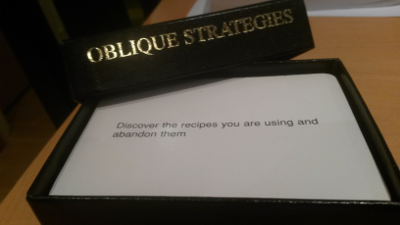Note to Self - Stop Arguing with People on Facebook
Note to Self - Stop Arguing with People on Facebook
I’ve totally had it with arguing with people on Facebook. I just took the trouble to dig by “Oblique Strategies”[1] cards out of a drawer and look for the one that’s pertinent to the situation I find myself in.
Discover the recipes you are using and abandon them

I actually think the second half of that piece of advice is probably redundant most of the time - once you make explicit the recipes you’re following, you’re going to abandon them, or wish you could abandon them.
So what’s the recipe that I’m using? Well it goes a little something like this.
-
Find something that really annoys you on Facebook (this is really easy) e.g. Stephen Fry talking about God, people saying “I’m all in favour of free speech but…”, feminists claiming they want freedom for women through censorship for everybody (see, I’m getting annoyed already).
-
Say what you think
-
Be surprised when people you thought were right-thinking and sensible don’t agree with you
-
Try to argue them round to your point view
-
Fail
-
Annoy them in the process
-
Annoy yourself in the process
-
Really wish that you hadn’t said anything.
What’s weird is that in actual social situations, rather than social networking situations, it’s a lot easier to avoid these hot-button topics. Of course, in real life situations, you don’t talk to a feminist about feminism - or an atheist about atheism - or a religious person about religion, or a vegetarian about vegetarianism. Just by instinct, you know that this is a bad thing to do - so why is it any different on the net? Why do I forget that online?
And it’s the same with my philosophical training - I learned maybe 20 years ago that all studying a philosophy degree at St Andrews University taught me (aside from the vital life skills of how to tie a bow tie and how to open a bottle of champagne) was a way of arguing about the important issues in life (God, science, ethics, abortion) that seriously pissed people off or makes them thinks you’re weird. I went out for dinner with my friend and his calm, sensible, mild-mannered brother in 1991. Ok, so I might have drunk a bottle of Beaujolais before I went out. Ok, from the hangover I had the next day, it might have actually been re-labelled brake fluid. Still that doesn’t explain how I managed to get my friend’s mild-mannered, wouldn’t say booth to a goose, physicist, brother to end up yelling “I DON’T UNDERSTAND YOU!” about an inch from my face. After bringing up the fact that inductive reasoning - on which all of science is based - is, as we philosophers term it - “A load of old cobblers.” Talking about inductive reasoning to a scientist isn’t a red rag to a bull. It’s more of a kick in the bollocks to an aggressive skin head. I learned 20 years ago to simply not do it “IRL” (in real life).
So why do I forget that online?
Actually, I suspect you can say even less online than you can if you’re talking to people in real life. In real life you can get away with saying really offensive stuff - and people will laugh and think it’s funny (or maybe not). If you said the same stuff online you could end up in jail.
So from now on, please God (who nobody, not even Richard Dawkins can prove doesn’t exist, there I go again) grant me the wisdom to like things and make the occasionally funny comment but mostly just shut the fuck up when I’m on Facebook.
[1] “Oblique Strategies” are a set of things to try to help you, when you’re in a creative rut, developed by Brian Eno and Peter Schmidt. It occurs to me that you might see them as a way of solving the problem of getting stuck in the game that I talked about yesterday.